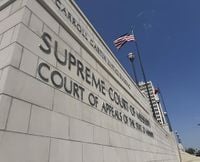Mississippi’s Supreme Court districts are facing a seismic shift after a federal judge ruled that the state’s long-standing judicial maps violate the federal Voting Rights Act by diluting Black voting power. On Tuesday, U.S. District Judge Sharion Aycock, appointed by President George W. Bush, delivered a 105-page ruling that not only found the state’s three Supreme Court districts unconstitutional but also barred Mississippi from using them in future elections.
Judge Aycock’s decision comes at a pivotal moment, as the nation marks the 60th anniversary of the Voting Rights Act (VRA), a law that dramatically expanded ballot access for Black Americans and other minorities. According to reporting from The Week and Mother Jones, the VRA has been under sustained attack in recent years, particularly from the U.S. Supreme Court, which gutted its core protections in 2013. Still, Aycock’s ruling in Mississippi signals that the fight for fair representation is far from over.
“In short, the evidence illustrates that Black candidates who desire to run for the Mississippi Supreme Court face a grim likelihood of success,” wrote Judge Aycock in her detailed opinion, as cited by Mississippi Today. Since the creation of the state’s Supreme Court, only four Black justices have ever served, and none has been elected without first being appointed by the governor. Even more telling, no Black person from the Northern or Southern districts has ever served on the high court.
Mississippi law divides the state into three Supreme Court districts: Northern, Central, and Southern. Each district elects three justices, making up the nine-member court. These districts haven’t been redrawn since 1987, despite significant demographic changes—especially in the Central District, which encompasses much of the majority-Black Delta and the Jackson Metro area. Currently, that district is represented by two white justices, Kenny Griffis and Jenifer Branning, and one Black justice, Leslie King. Last year, Branning, a white candidate who described herself as a “constitutional conservative” and received Republican Party backing, defeated Jim Kitchens, a white justice widely viewed as a candidate supported by Black voters.
The lawsuit challenging these districts was filed in April 2022 by the American Civil Liberties Union (ACLU), the ACLU of Mississippi, the Southern Poverty Law Center, and private law firms. They represented a group of Black Mississippians, including state Senator Derrick Simmons and Ty Pinkins, a former Democratic nominee for the U.S. Senate. Their argument: the current maps systematically undermine Black voters’ ability to elect candidates of their choice, violating the VRA’s core promise.
Judge Aycock’s ruling requires the Mississippi Legislature to redraw the Supreme Court districts to ensure compliance with the Voting Rights Act. A status conference will be convened soon to discuss an appropriate deadline for lawmakers to act. However, there’s a complication—the Legislature has already adjourned its regular session for the year, and only Governor Tate Reeves holds the power to call a special session to address the issue. Mississippi could also appeal the ruling to the conservative U.S. 5th Circuit Court of Appeals, setting the stage for a protracted legal battle.
This case lands at a time when the broader landscape of voting rights in the United States is increasingly fraught. As Mother Jones reported, the Supreme Court under Chief Justice John Roberts has been steadily chipping away at the VRA’s protections. In 2013, the Roberts Court struck down the requirement that states with histories of discrimination obtain federal approval before changing their voting laws—a move that many civil rights advocates say opened the floodgates for new forms of voter suppression.
More recently, an appeals court ruled in 2025 that only the U.S. Department of Justice—not private citizens or advocacy groups—can bring lawsuits under the VRA. This decision is now on hold while the Supreme Court weighs it, but if upheld, it could dramatically limit the ability of individuals to challenge discriminatory voting laws. As Stephen L. Carter wrote in Bloomberg, “the protection of voting rights would rest upon the accident of who holds power” in Washington, D.C.
That’s not a comforting thought for many voting rights advocates, especially considering recent actions by the Trump administration’s Justice Department. According to Slate, the department gutted its Voting Rights Section and even threatened to prosecute local election officials for failing to stop alleged “fraud.” Meanwhile, Republican lawmakers are pushing for the SAVE Act, which would require proof of citizenship—such as a passport or driver’s license—to register to vote. Critics warn that such measures could disenfranchise many low-income Americans who lack these documents.
For many, the Mississippi case is emblematic of a nationwide struggle over the future of the Voting Rights Act and the multiracial democracy it helped create. As Jamelle Bouie observed in The New York Times, “The law demolished the architecture of Jim Crow disenfranchisement and cleared a path for millions of Black Americans living in the South to vote and have a voice in their country’s present and future.” Yet, with the Supreme Court and Republican-led states pushing for more restrictive voting laws, Bouie warns that “it’s this America that Donald Trump and his movement hope to condemn to the ash heap of history.”
Mississippi’s situation is especially poignant given its history. The state was once ground zero for Jim Crow-era voter suppression, employing poll taxes, literacy tests, and outright intimidation to prevent Black citizens from voting. The VRA, passed in 1965, was designed to dismantle these barriers and ensure that all Americans had a voice at the ballot box. For decades, the law was remarkably effective. But as Ari Berman noted in Mother Jones, “The Voting Rights Act is being attacked from every angle.”
Now, with the fate of Mississippi’s Supreme Court districts hanging in the balance, the state finds itself once again at the center of a national debate over race, representation, and democracy. The outcome will not only shape the composition of Mississippi’s highest court but could also set a precedent for how other states draw their judicial and legislative maps.
As the legal and political wrangling continues, one thing is clear: the struggle for fair and equal representation in Mississippi—and across the United States—is far from settled. The next moves by the Legislature, Governor Reeves, and the federal courts will be closely watched, not just by Mississippians, but by anyone concerned about the health of American democracy.






